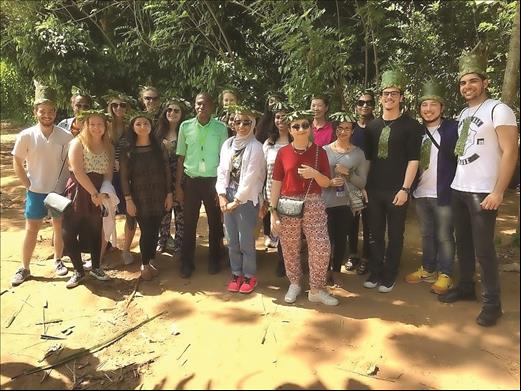
Georgetown University in Qatar team studies Zanzibar's revolution
Doha: Fourteen Georgetown University in Qatar (GU-Q) students have returned from a rigorous 10-day trip to Oman, Zanzibar and Tanzania.
The students of GU-Q";s Zones of Conflict, Zones of Peace (ZCZP) programme explored the history, politics, and reconciliation efforts that continue in the wake of the 1964 revolution in Zanzibar.
In each destination countries, students, accompanied by a faculty member, a researcher and three GU-Q staff, met key actors, including politicians, journalists, community organisers and other change-makers, to understand their perspectives of the ethnic conflict.
'Omanis had been living in Zanzibar for about 150 years before the revolution. Through ZCZP, which focuses on studying a specific conflict and learning about how a society rebuilds afterwards, we took our students to Muscat to meet people who grew up in Zanzibar before moving to Oman.
'We also went to Zanzibar to meet Arabs who stayed following the revolution,” said Jacqui Snell, Educational Enrichment Manager and Programme Organiser, GU-Q.
'The meetings and visits spurred students to contemplate whether the conflict was a genocide or revolution, and learn how genocide is constructed and labelled in the international community.”
Preparation for the trip began with 25 hours of in-depth class work led by an expert on the Indian Ocean, Dr Rogaia Abusharaf, Associate Professor of Anthropology, GU-Q.
For participating junior Mariam Diefallah (SFS-Q ";17), ZCZP was an eye opening experience.
'I think very few people are given the opportunity to see and verify for themselves the knowledge they gain from books and articles.
'I gained a lot of knowledge on a conflict that very few people know about. This knowledge was enriched during the trip as we met scholars, academics and survivors, which gave the conflict a human aspect added to the academic one. This is why I think the programme is essential for students,” she explained.
Leveraging the benefits of Georgetown";s top-tier faculty base, ZCZP asks faculty members to propose locations and conflicts to study. 'This was the second time our faculty proposed a topic, which is great because it means they bring expertise to the programme,” said Snell.
In 1698, Zanzibar became part of the overseas holdings of Oman under the control of the Sultan of Oman. Following centuries of control by empires, Oman";s monarchical rule was overthrown in January 1964.
The island became a part of Tanzania following an uprising that saw several thousand unarmed ethnic Arab and Indian civilians killed and thousands arrested or expelled from the country.
The Peninsula
if(window.innerWidth < 728){ googletag.display('div-gpt-ad-796530061225000279-1'); }



















Comments
No comment